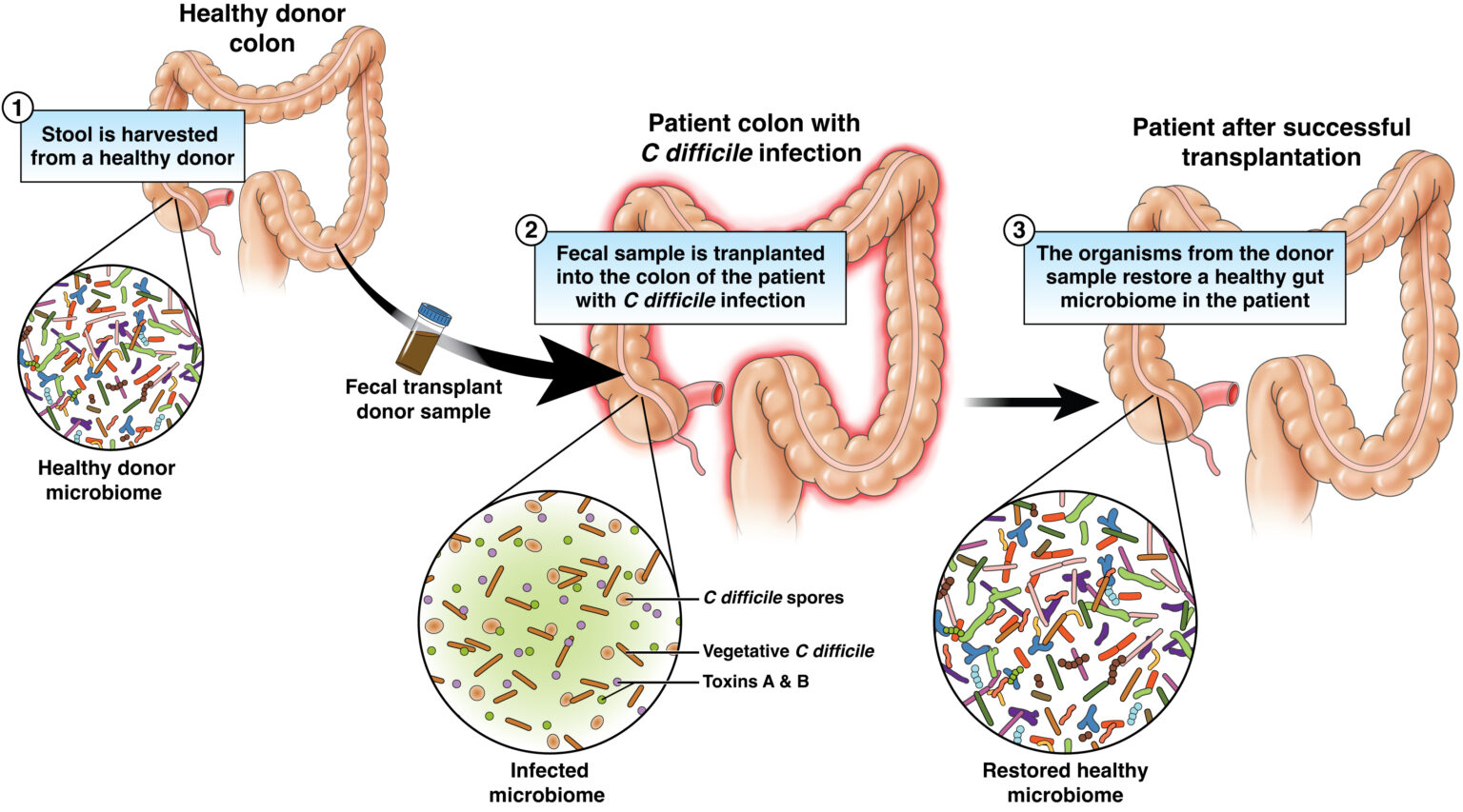
Peshkova/istock via Getty Images
Exploring the Challenges and Promises of Fecal Microbiome Transplants
Fecal microbiome transplants have transitioned from being on the fringes of medicine to the forefront of scientific research and clinical practice.

Fecal microbiome transplants (FMTs) have emerged as a groundbreaking therapeutic approach. Once confined to the fringes of medicine, FMTs are now at the forefront of scientific research and clinical practice.
Before diving into the world of FMTs, it is vital to understand the human microbiome. The human body is host to trillions of microorganisms, collectively known as the microbiome, which plays a crucial role in maintaining health. This intricate ecosystem resides primarily in the gastrointestinal tract, influencing digestion, metabolism, immune function, and mental health. Any disruption in this delicate balance can lead to various health issues.
What Is a Fecal Matter Transplant?
A fecal matter transplant is a therapeutic procedure in which fecal matter derived from stool is collected from a healthy donor and transferred into a recipient's gastrointestinal tract to restore a balanced microbiome. Although transplantation is usually performed via colonoscopy, the transplant can also be delivered via a nasogastric tube, an oral capsule, or an enema.
The success of FMT lies in its ability to restore a healthy microbiome using the following four steps.
- Donor selection: Identifying a suitable donor is crucial. Donors undergo rigorous screening to ensure they have a diverse and healthy microbiome. Typical criteria include absence of chronic diseases, no history of gastrointestinal disorders, and negative test results for infectious diseases.
- Stool processing: The collected stool is processed to remove solid particles, leaving behind a liquid suspension rich in beneficial bacteria.
- Transplantation: The processed stool is then introduced into the recipient's gastrointestinal tract using the appropriate method.
- Microbiome reestablishment: Once introduced, the healthy donor microbiota colonizes the recipient's gut, restoring microbial balance.
Applications of FMT
Fecal microbiota transplantation has found diverse applications in the field of healthcare.
Clostridium difficile Infections
It has gained significant attention for its remarkable success in treating conditions like Clostridium difficile infection (CDI). This antibiotic-resistant bacterial infection annually infects around 200,000 people in the United States (pictured below).
CDI poses a considerable challenge in healthcare settings, as traditional treatments, such as antibiotics, often fall short of completely eradicating the infection and can even lead to recurrent episodes. FMT is a highly effective alternative, boasting cure rates that surpass 90% in some studies.
Inflammatory Bowel Disease
Additionally, FMT shows promise in addressing inflammatory bowel disease (IBD), encompassing its two primary forms — Crohn's disease and ulcerative colitis. While researchers continue to study FMTs, preliminary results indicate that FMT may help reduce inflammation and improve symptoms, offering hope for IBD patients.
Obesity and Type 2 Diabetes
Beyond CDI and IBD, emerging research explores FMT's potential in tackling metabolic disorders, including obesity and type 2 diabetes. The growing understanding of the gut microbiome's profound influence on metabolism has paved the way for innovative treatments, with FMT at the forefront of these explorations. Thus, FMT holds significant promise across various medical conditions, from infectious diseases to chronic inflammatory disorders and metabolic health.
Challenges
Although FMT holds significant promise in the healthcare sector, it has several notable challenges.
Safety and Regulation
One challenge is related to regulatory hurdles. Currently, there is no uniform regulation governing FMT, resulting in variations in donor screening, processing, and administration practices. However, in November 2022, the FDA published guidance regarding investigational new drug requirements for using fecal microbiota for transplantation to treat CDIs not responsive to standard therapies.
Standardizing stool processing and storage methods is another critical challenge. Maintaining the viability of donor microbiota is vital for the success of FMT procedures, making it imperative to establish consistent stool handling and preservation protocols.
Additionally, the long-term safety and efficacy of FMT remain a concern to many. Although FMT shows potential in treating various conditions, comprehensive data regarding its long-term effects still needs to be provided. While additional research is essential to gain a more thorough understanding of its capabilities and limitations, some studies suggest that FMTs are safe both in the short and long term with no sign of harmful effects.
Donor Availability
Another obstacle is donor availability. Finding suitable donors for FMT can be complex, especially considering the increasing demand for this procedure. Consequently, streamlining the donor recruitment process is crucial to ensure a stable supply of qualified donors.
Ethical and Social Considerations
Ethical and social considerations also come into play with FMT. This therapy raises questions regarding informed consent, donor compensation, and the commercialization of human waste. It is imperative to carefully address these ethical issues to ensure the responsible and ethical implementation of FMT in the healthcare sector.
The Future of FMTs
Despite these challenges, FMT's future in the healthcare sector looks promising for various applications.
As our understanding of the microbiome deepens, FMT could become a tool for personalized medicine. Tailoring treatments to an individual's unique microbiome profile holds immense potential.
FMT is just the tip of the iceberg. Researchers are exploring other microbiome-based therapies, such as synthetic microbial consortia, which could provide targeted solutions for various diseases.
FMT is likely to find applications beyond CDI and IBD. Ongoing research may unveil its potential in effectively managing conditions like allergies, autism, and even mental health disorders.
The healthcare sector will likely see increased collaboration between biotech firms, pharmaceutical companies, and healthcare providers to develop standardized FMT products and therapies.
Fecal microbiome transplants represent a paradigm shift in healthcare, potentially revolutionizing treatment approaches. While challenges persist, ongoing research, regulatory efforts, and industry collaboration are paving the way for FMT to become a mainstream therapeutic option. In the healthcare sector, FMT is poised to make a substantial impact, offering innovative solutions to a range of complex health issues.
As our understanding of the human microbiome deepens, FMT's role in personalized medicine and targeted therapies is only set to expand, promising a healthier future for patients worldwide.




